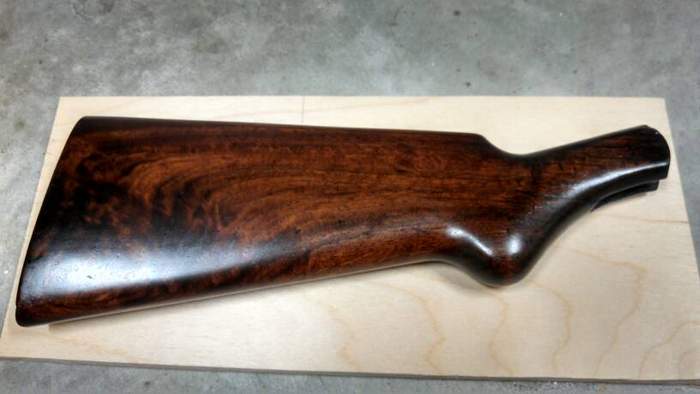
Are you considering gunstock refinishing with linseed oil? Linseed oil is a common wood finish used by those who make gunstocks using traditional techniques. Most linseed oil finishes are applied with a brush, but some prefer to use a cloth or newspaper “pad.” Oil is a biological resin found in many plant seeds, including flax. For centuries, linseed oil has been used to dye sugar and make woodwork varnish. Today, linseed oil is used to preserve wood and decorate it with various colors.

What is Linseed Oil?
See our post on a matte vs satin wood finish.
What are you going to need?
Flathead and Phillips screwdrivers
Use the screwdriver to re-coil the stock’s pad, butt plate, and sling swivels.
Masking tape
Use masking tape to cover the parts you are avoiding sanding. You would not want to sand some perfect area accidentally. When the final coat dries, remove the masking tape and apply one coat of oil to the checkering. Use a cloth to apply the final coat.
Sandpaper block and fine-grit sandpaper
A piece of sandpaper is for removing the finish. Be gentle as you sand your surface. Work on the grooves and across the ridges using the block. Insert a piece of sandpaper inside the sanding block as you prepare to sand the block. Use the grain to guide you.
Soft cloth
Use the cloth to wipe off the old finish, dust, and dirt before you start rubbing in the oil. It has to be soft so that you do not scratch the gun.
Boiled linseed oil
When the stock is clean, apply drops of linseed oil on your fingers as you rub it into the wood. Wait for complete absorption. Three to four coats give a durable oil coat to the gun. Each oil coat has to dry overnight.
Rubber gloves
Rubber gloves protect you from chemicals from the finish remover. They protect your hands and skin.
Spray-on finish remover
It is important to strip your stock of its old finish before you start working on your gunstock. The finisher has to be safe, biodegradable, and easy to use. Hang your gunstock so that you have easy access to the surface using a wire coat hanger. Honor the waiting time before you take off the old finish.
Steel wool
Use the steel wool to wipe off sawdust. It gives a smooth finish to the gunstock. A cloth finalizes the cleaning process. The steel wool tears off extra grit on the outside of the stock.
What is gunstock refinishing?
Gunstock refinishing is a process that involves reviving the old finish on your gun. Amongst the multiple finishes that you can get, the focus is on linseed oil. Applying the oil is a process that involves stages.
They are worth following for a perfect project. You have to disassemble your gun for a finish. That helps your hand to maneuver the stock with all the parts involved. Make sure there are no bullets inside the gun. If you are afraid of mixing up the gun parts, label them.
Cleaning the gunstock
When cleaning the gunstock, you remove dirt, dust, and grease. After stripping off the old paint or finish on your stock, there are stains inside the pores and grease. That is why you need to clean the gunstock.
Boil some water and use a degreasing substance. Allow the stock to sit in the degreasing agent for the required time. Pour your water on top of your gunstock and let it float for 5 minutes. Flip it to the other side and repeat the process till the water is warm.
Drying
When your stock is clean, remove it from the water, hang it and let it dry. Heating decreases the drying time, and it is a result of the friction of rubbing. That creates a polished finish. Remove the old finish before you rub the oil. Weak points become visible when the stock is clean and dry. These include cracks that have to be filled before applying the oil.
Buffing
Buffing your stock gun is a process that involves the application of wax to your gun stock to bring back the shining surface. Use a clean cloth to start buffing the gunstock. A thin coat will do the trick. The same way you buff your nails for a shiny effect is what happens on your gunstock.
How to strip the old finish
There is what is left in your stock from previous projects. Remove the original finishing stripper. A plastic stripper is safe since it does not scratch your gunstock. Follow the manufacturer’s instructions for a flawless surface.
If the stock does not have many scratches, gently sand, but if there are more scratches, use more grit. You need protective clothing before you start removing the old finish. That includes goggles, rubber gloves, and a face mask.
You are allowed to use chemical strippers from hardware stores. Conduct the process in a well-ventilated area and rub the stripper in small portions and in a circular motion. Use steel wool and rub it with the grain.
Sanding
Sanding your stock gives you sawdust residue that you mix with your epoxy. The mixture fills up cracks. The wood mixture looks like wood mud. Use a toothpick or thin stick to push your mixture into the cracks.
Go from a lower number of grits till you reach about 400 grit. Make use of sandpaper blocks or pads to curve the edges with ease. Sanding saves time and effort in smoothing the surface of your stock. An electric sander is not ideal for the job since it leaves swirl marks. They appear when you apply your stain.
Applying the linseed oil
Use the spray version of the linseed oil. It is faster, easy to use, and spreads evenly. Three coats are enough. Let each coat dry before you apply the second one. The process takes 8 to 12 hours. Use fine-grit sandpaper to sand the gunstock and between coats. That removes imperfections caused by the finish.
Applying Lacquer
An exterior Lacquer is ideal for a gunstock as it is easy to apply. It gives protection to your gunstock. The oil finish gives the gunstock a glossy look appealing to the eye. Apply the finished form to a can or spray gun. Be careful when applying the oil since it is highly flammable.
Applying Polyurethane
Polyurethane is a finish that comes as an oil blend. It comes in multiple forms that you have to choose from. The liquid coating dries clear. Use a brush to apply. The type of resin protects your gunshot.
Applying Wax
Wax is for buffing the gunstock. It gives your stock an eye-catching glossy finish. A thin layer of wax is enough. It has to be applied directly for better results. The wax gives it a shiny finish that shows the beauty of your surface.
Applying Clear Varnish
A clear varnish gives you a beautiful finish protecting your gunstock. The coating is tough and resistant to tear and wear. It works as a sealant with excellent waterproofing features. Allow the gun to dry before you put it to use and assemble the parts.
How many coats of linseed oil on a gun stock
You can refinish a gun stock with as little as 4 coats of linseed oil. It is always worth testing things out case by case. There are instances where you can use 14 coats before the wood is saturated. You are looking for saturation.
How many coats of boiled linseed oil on gunstock
You should use at least four coats of boiled linseed oil on your gunstock. If you want a deep, rich color, you can use up to 14 coats. Boiled linseed oil will help to protect the wood and keep it looking its best.
Video Tutorial
- Grain and Sheen: Teak Oil versus Danish Oil Uncovered - January 10, 2024
- The Cherry on Top: Crafting the Perfect Cutting Board - January 9, 2024
- Polyurethane Water-Based vs Oil-Based: Choosing the Right Finish - January 8, 2024